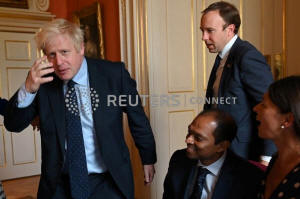British PM Johnson bids for election as opponents seek to stop no-deal
Brexit
 Send a link to a friend
Send a link to a friend
 [September 04, 2019]
By Michael Holden, Guy Faulconbridge and Elizabeth Piper [September 04, 2019]
By Michael Holden, Guy Faulconbridge and Elizabeth Piper
LONDON (Reuters) - British Prime Minister
Boris Johnson will try to call a snap election on Wednesday after
lawmakers seeking to prevent him taking Britain out of the European
Union without a divorce deal dealt him a humbling parliamentary defeat.
Parliament's move leaves Brexit up in the air, with possible outcomes
ranging from a turbulent no-deal exit to abandoning the whole endeavour
- both outcomes would be unacceptable to swathes of the United Kingdom's
voters.
An alliance of opposition lawmakers backed by 21 rebels from Johnson's
Conservative Party defeated the government on Tuesday on a motion
allowing them to try to pass a law which would force a three-month
extension to Britain's EU exit date.
Johnson cast the rebellion as an attempt to surrender to the EU, vowed
never to delay Brexit beyond Oct. 31 and said the country needed an
election. The government has scheduled a vote on an election after about
1800 GMT on Wednesday. [nL5N25V204]

But opposition parties and rebels in his own party said they would not
allow a no-deal Brexit to be "smuggled" through under the cover of an
election.
"We're not going to dance to his tune," said Keir Starmer, the
opposition Labour Party's point man on Brexit. "It's obvious what he's
up to. He wants to intercept this bill having lost control of parliament
and stop us finishing the task in hand.
"We're not going to vote with Boris Johnson today to deprive ourselves
of the opportunity to complete the business that we've just seized
control of the house to do," he said.
The showdown between prime minister and parliament continues on
Wednesday with a dizzying array of events planned including a vote on
the attempt to block no deal, a vote on Johnson's election bid and
weekly questions to the prime minister.
As the three-year Brexit crisis approaches a crescendo, the United
Kingdom was edging towards an election as most British politicians see
no other way to break the impasse.
One scenario is for opposition parties to defeat Johnson's bid for an
election until they have passed their bill blocking a no-deal Brexit.
Once in law, opposition parties could then agree to an election,
possibly on Oct. 15.
"Base case is pre-Brexit election, but not necessarily before the 31st
October," U.S. investment bank Citi said. "No deal risk persists, but
now wrapped in a general election."
BREXIT HANGS IN BALANCE
Beyond the frantic push and shove of British politics, the United
Kingdom still fundamentally has three main Brexit options: leave with a
deal, leave without a deal or cancel Brexit altogether.
An October election would open up three likely options: a Brexit-supporting
government under Johnson, a Labour government led by veteran socialist
Jeremy Corbyn or a hung parliament that could lead to a coalition or
minority government of some kind.
[to top of second column]
|

Britain's Prime Minister Boris Johnson and Britain's Health and
Social Care Secretary Matt Hancock react as they arrive to pose with
NHS workers inside 10 Downing Street in London, Britain September 3,
2019. Daniel Leal-Olivas/Pool via REUTERS

The type of Brexit that emerges from that election is unclear,
though there would be little time for a deal before the Oct. 31
deadline. An avowedly pro-Brexit government could overturn any laws
aimed at preventing a no-deal Brexit.
Johnson has promised to lead the United Kingdom out of the European
Union with or without a deal, raising fears that he could catapult
the world's fifth largest economy into an abrupt departure from the
bloc without agreement on how to handle everything from food
regulations to car component imports.
In a sign of just how far Brexit has distorted British politics,
Johnson's Conservatives vowed to expel the 21 rebels - including the
grandson of Britain's World War Two leader Winston Churchill and two
former finance ministers - from the party. Johnson also lost his
working majority in parliament.
"How, in the name of all that is good and holy, is there no longer
room in the Conservative Party for @NSoames?" Ruth Davidson, who
quit as the Conservatives' leader in Scotland last week, wrote on
Twitter.
In one piece of good news for Johnson, the face of the 2016 Vote
Leave campaign, a Scottish court ruled that his decision to suspend
parliament later this month was lawful.
Judge Raymond Doherty said the question was not a matter for the
courts and was a political issue which should be judged by
parliament and the electorate. [nL5N25V2DN]
Johnson said he did not want a no-deal Brexit - which investors warn
would roil financial markets and send shockwaves through the
European economy - but it was necessary to put it on the table so
that Britain could negotiate the result it wanted.

The EU has refused to renegotiate the Withdrawal Agreement reached
with Johnson's predecessor Theresa May last November, and there were
reports in British newspapers that Johnson's top adviser Dominic
Cummings had described negotiations as a sham. [L5N25V1B2]
When asked on Wednesday if that was how he saw the Brexit
negotiations with the EU, Cummings told Reuters: "No. I never said
that."
(Writing by Guy Faulconbridge and Michael Holden; Editing by Janet
Lawrence)
[© 2019 Thomson Reuters. All rights
reserved.]
Copyright 2019 Reuters. All rights reserved. This material may not be published,
broadcast, rewritten or redistributed.
Thompson Reuters is solely responsible for this content. |